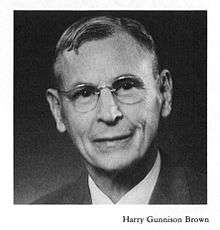Harry Gunnison Brown
Harry Gunnison Brown (1880–1975) was a Georgist[1] economist teaching at Yale in the early 20th century.

Early life
Harry Gunnison Brown was burn in Troy, New York to Milton Peers and Elizabeth H. (Gunnison) Brown. He graduated from Williams College in 1904, studied at Ohio State University and he earned his Ph.D. at Yale University in 1909. While studying at Yale, Brown became a protege of Irving Fisher. Fisher was one of the pioneers in the development of mathematical economics and econometrics in the United States.[2]
Academic career
After receiving his Ph.D., Brown worked as an instructor under Irving Fisher in the economics department at Yale University until 1915. Brown held Herbert Davenport in high regard, and in 1915 Brown accepted a position under Davenport in the College of Business at the University of Missouri. Brown worked under Davenport for one year at Missouri, until Davenport left for a position at Cornell University in 1916. Brown remained at MU, and during his career he became chairman of the economics department as well as dean of the College of Business and Public Administration. Brown retired from MU in 1950.
For much of his career, he was mainly known North America's foremost advocate of the ideas of a land tax. He is described by Mason Gafney as having refuted:
- John Bates Clark's argument that the unearned increment was constructive
- Frank Knight's argument that land is like all other resources because it has an opportunity cost
- Richard T. Ely's argument that 'ripening costs' of land speculators justify urban sprawl.[3]
Works
Brown, Harry. G. (1931) Economic Science and the Common Welfare
References
- ↑ Brown, H. G. "A Defense of the Single Tax Principle." The ANNALS of the American Academy of Political and Social Science 183.1 (1936): 63-69. Quote: "The truth is that I recognize the fundamental justice and common sense of the single-tax idea. But that any other tax than a tax on land values is always and everywhere wrong, regardless of public needs or the nature of this other tax, I do not maintain."
- ↑ Lissner, Will. "In Memoriam: Harry Gunnison Brown, 1880-1975". American Journal of Economics and Sociology. July, 1975.
- ↑ Gaffney, Mason (1998)Harry Gunnison Brown in The New Palgrave: A Dictionary of Economics (1987) edited by John Eatwell, Murray Milgate, and Peter Newman.
Further reading
- Essays in Honor of Harry Gunnison Brown, The American Journal of Economics and Sociology 11(3) April, 1952
- Ryan, C. K. (1997). Harry Gunnison Brown's advocacy: the case he made for land value taxation 1917-1975]. The American Journal of Economics and Sociology, 56, 545-563.